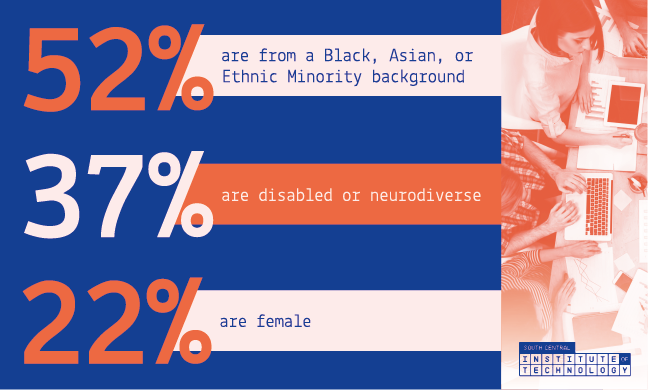South Central Institute of Technology Commits to Diversity

The South Central Institute of Technology (SCIoT) has made a firm commitment to equality and diversity by signing up to the Tech Talent Charter. The Charter is an agreement between businesses and education in the tech sector to both promote inclusion and importantly, to keep track of progress towards it by measuring and sharing levels of diversity. The Charter already boasts some big-name signatories including Microsoft, KPMG, Sainsbury’s, Dominos and various government departments.

Diversity in the Tech Sector
The tech sector has struggled for a long time to be more open and equal. According to a report from the Chartered Institute for IT (BCS) only 19% of UK IT professionals are female and just one in ten sixth form students who are taking A-Level Computer Studies are female.
It also reports that while 14% of the UK working population is from a Black, Asian or Minority Ethnic background, only 8.5% of senior leaders in the sector come from those communities. The figures are no better when it comes to disability. 19% of the nation’s workforce has a disability but only 9% of IT specialists. Meanwhile, there are 600,000 unfilled job vacancies in digital technology across the country at an estimated cost to the economy of £63 billion per year.
Alex Warner, Principal of the SCIoT, said,
“It is by design that “Inclusion” is the number one value of the SCIoT. In everything we do we want to look through a lens that is committed to widening access and participation and this includes everyone. By everyone we mean our students, our staff and the community we serve. We want all to know that at the SCIoT they belong, and they matter. Signing the Tech Talent Charter was an easy decision because of our aligned purpose and values. The Charter compels us to do more and be more within our ecosystem. We will closely monitor progress and share this with the Charter Group to help build an up-to-date national picture of how we are attempting to overcome social injustices. This is a national problem which all educational institutions and businesses need to address on an individual basis but we can also help each other by sharing best practice and promoting a united front.”
The SCIoT operates an EDI (Equality, Diversity & Inclusion) Steering Group and is already making progress in attracting students from harder-to-reach groups. Of students already recruited, 52% are from a Black, Asian, or Ethnic Minority background, 37% are disabled or neurodiverse, while 22% are female. Meanwhile, staff jobs are being advertised in places most likely to attract diverse applicants like Diversity in Tech, Women in Tech, IT Graduate jobs and various other Digital and IT-focused platforms. Alex said,
“The initial efforts appear to be having an impact, but our ambitions are to reflect the community we serve and we have to do more to reflect society across Milton Keynes, Oxford and Reading. We want to increase the number of students from all those areas from where fewer people have traditionally accessed Higher Education. If the plan is to “Level Up” we have to try to address all forms of inequality.
Debbie Forster is CEO of the Tech Talent Charter. Welcoming the SCIoT she said,
“The importance of greater inclusion and diversity in tech is, thankfully, no longer up for debate. Sectors and organisations now need to work together to shift the dial – and this will happen a lot quicker if we pool our successes, failures, ideas and learn from them to bring about real structural change. In our inaugural report, we stressed the importance of collaboration. One single company can’t do it alone, which is why we’re asking organisations to sign up to the Tech Talent Charter and join the movement (now approximately 500 Signatories). Companies can also access our TTC Toolkit, a set of free resources designed to help organisations improve their inclusion and diversity”.
Find out more about the Tech Talent Charter here. You can also follow them on Twitter (@techcharteruk) and LinkedIn (@tech talent charter)
